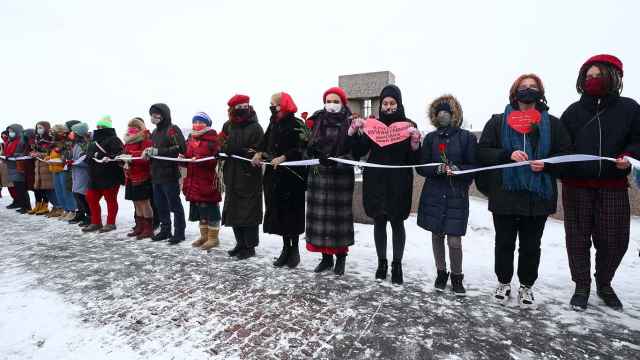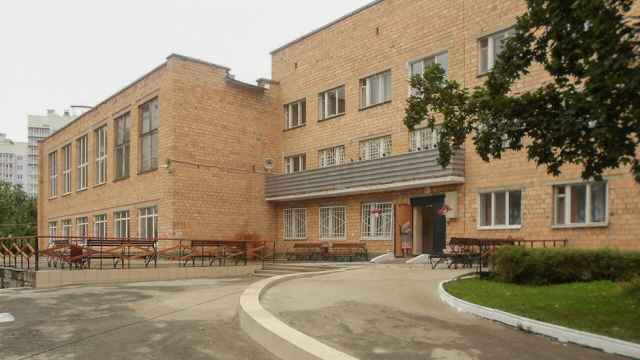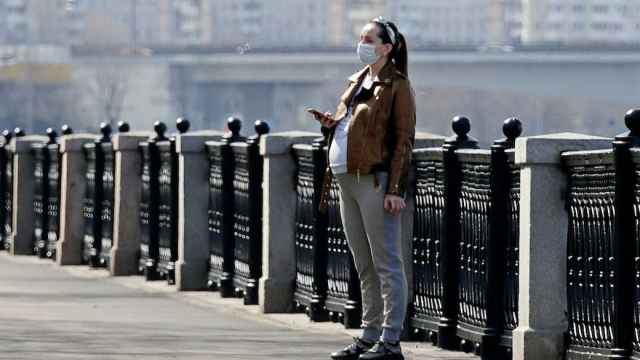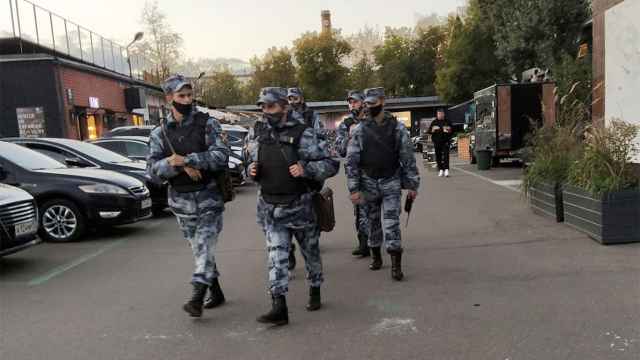Abortion rights are on the minds of citizens and officials across Europe this week.
In Ireland, protesters marched through the streets of Dublin in the thousands demanding their government hold a referendum to repeal restrictive abortion laws. The same week, the Polish parliament shocked Europe by voting through a draft law on a total abortion ban in its first reading, spurring protests across the country and even a scheduled national women’s strike next week. On Tuesday, Russia also reopened its own abortion debate.
The head of the Russian Orthodox Church, Patriarch Kirill, endorsed an anti-abortion petition earlier this week. The document, drafted by the religious groups “For Life” and “Orthodox Volunteers,” had been approved by a patriarchal commission on family, motherhood, and children, the church said in a statement.
This wasn’t the first time Russia's most powerful cleric called on the government to stop supporting abortions (90 percent of which are state-funded in Russia). Last year, he addressed the government with the same plea.
While the Kremlin generally supports the social conservatism propagated by the church, officials have largely ignored its calls to reduce access to abortion.
Abortion’s Special History in Russia
In 1920, spurred by communist ideas about gender equality and women’s rights, the Soviet Union became the first state in the world to legalize abortion. This lasted less than two decades, however, and abortion was criminalized again in 1936, under Stalin’s rule, when the avant-garde ideas of a socialist future gave way to the conservative vision of a Soviet Empire, built on Russia’s tsarist patriarchal roots. The Communist Party theoretically endorsed women’s “equal rights,” but insisted that women were “not free from their natural duty.”
But the ban on abortion didn’t work. The procedure was still carried out regularly, albeit illegally, and homicides of newborn children rose. By the mid-1950s, it became clear that the archetypical family with many children no longer existed. In 1955, Soviet officials legalized abortion again, and it’s remained that way since. Within twenty years, it had become a recognized social practice.
In the USSR, abortion was largely used as a form of contraception. The rate of abortions has declined gradually in post-Soviet Russia, but it remains abnormally high. After China, Russia has the highest abortion rate in the world: in 2015, there were 930,000 abortions performed in the country — and that’s just the official figure, excluding abortions performed outside the medical system. The total number of annual abortions could be twice as high, experts say.
Since the fall of the Soviet Union, there have been numerous attempts to change Russia's laws on reproductive rights. Moscow’s recent conservative turn has only increased the number and frequency of these initiatives. But most efforts go nowhere.
Ekaterina Schulman, a political scientist who specializes in Russian social issues, says Vladimir Putin's political party, United Russia, tries to have it both ways on abortion. “They support the conservative trend, but they understand that banning abortion would lead to social catastrophe,” she says.
State officials have consistently rejected initiatives to ban abortion as financially unreasonable, citing the fact that it would lead to an “increase of children without parental protection who are socially dependent on the state.” In other words, embracing the pro-life movement would raise poverty and overcrowd the country’s already packed orphanages.
Deputy Prime Minister Olga Golodets has said reducing abortion rates would be a “huge plus” for Russian demography, but she emphasizes that any decision “should be reasonable and should not lead to such serious consequences.”
The Russian Orthodox Church has been more successful when it comes to supporting Christian groups operating on generous grants from the state. Russia's new children’s rights commissioner, Anna Kuznetsova, formerly headed such an organization in Penza, a city 600 kilometers southeast of Moscow. A mother of six and the wife of an Orthodox priest, Kuznetsova ran an organization called “Pokrov,” focusing in part on discouraging women from having abortions. It came as no surprise, therefore, when she announced her support for the patriarch, when he signed the anti-abortion petition. “The whole civilized world has been coming out against abortion for some time,” she said.
Fleeting Influence
Despite appearances, the Russian Orthodox Church has little influence over reproduction practices in Russia. Although 80 percent of Russians identify as Orthodox Christians, only 10 percent actually practice the religion and lead their lives according to its principles. In the Duma, the church is a powerful lobbyist, but its real interests, Schulman says, lie in property and land issues.
Russia's other conservative women politicians have also come out in support of the church. Senator Yelena Mizulina links abortions to “social aggression.” She says the procedure spreads “feelings of guilt” that provoke tensions in Russian society.
Human rights activists and liberals in Russia, however, have unanimously opposed calls to restrict access to abortion.
“Instead of taking care of and supporting children and orphans, they are suggesting a ban on abortion on religious grounds in a secular state,” said Anita Soboleva, Russia's presidential human rights commissioner. She went on to list the human rights violations in countries where abortions are banned. “Almost every case that reaches the European Court of Human Rights from Poland concerns the maltreatment of women,” she said.
In calling for an abortion ban, the Orthodox Church hopes to raise its influence to new heights in post-Soviet Russia, though state officials seem content to keep things as they are. Outside the debate about banning or allowing abortion, however, nobody in the country seems to know what to do about the fact that the number of abortions in Russia is enormously and abnormally high.
A Message from The Moscow Times:
Dear readers,
We are facing unprecedented challenges. Russia's Prosecutor General's Office has designated The Moscow Times as an "undesirable" organization, criminalizing our work and putting our staff at risk of prosecution. This follows our earlier unjust labeling as a "foreign agent."
These actions are direct attempts to silence independent journalism in Russia. The authorities claim our work "discredits the decisions of the Russian leadership." We see things differently: we strive to provide accurate, unbiased reporting on Russia.
We, the journalists of The Moscow Times, refuse to be silenced. But to continue our work, we need your help.
Your support, no matter how small, makes a world of difference. If you can, please support us monthly starting from just $2. It's quick to set up, and every contribution makes a significant impact.
By supporting The Moscow Times, you're defending open, independent journalism in the face of repression. Thank you for standing with us.
Remind me later.






